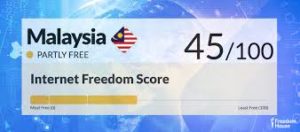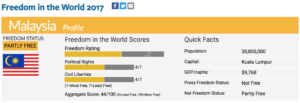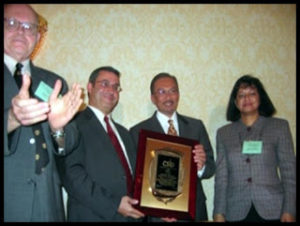 Malaysia’s political landscape took on a new hue after the 14th General Election (GE14) on May 9, 2018. The Alliance of Hope or Pakatan Harapan (PH) won the 2018 election, the first victory by a opposition coalition after 61 years of rule by the long-dominant National Front or Barisan Nasional (BN) led by the United Malays National Organization (UMNO). The power shift not only ended one of the world’s longest runs of one-party rule, it also offered a stark contrast to the global trend of democracies being tested by populist politics, notes analyst Khoo Ying Hooi.
Malaysia’s political landscape took on a new hue after the 14th General Election (GE14) on May 9, 2018. The Alliance of Hope or Pakatan Harapan (PH) won the 2018 election, the first victory by a opposition coalition after 61 years of rule by the long-dominant National Front or Barisan Nasional (BN) led by the United Malays National Organization (UMNO). The power shift not only ended one of the world’s longest runs of one-party rule, it also offered a stark contrast to the global trend of democracies being tested by populist politics, notes analyst Khoo Ying Hooi.
It is worth noting that the changes evident in the 2018 election results did not happen in a vacuum, she writes in the Diplomat:
 GE14 reflected an accumulation of grievances and opportunities built up over decades, starting from the Reformasi movement in 1998, followed by the emergence of the electoral reform movement, Bersih, that has organized five street protests since 2007. The “gentle” administration approach adopted by former Prime Minister Abdullah Badawi was arguably an important turning point that enabled the activation of democratic space for the growth of CSOs. However, as time went by, reforms began to slow and promises were not met. The weak political environment resulting from public dissatisfaction with a wide range of issues, especially in 2007, gave an advantage to the opposition parties and CSOs as they sought to advance their demands.
GE14 reflected an accumulation of grievances and opportunities built up over decades, starting from the Reformasi movement in 1998, followed by the emergence of the electoral reform movement, Bersih, that has organized five street protests since 2007. The “gentle” administration approach adopted by former Prime Minister Abdullah Badawi was arguably an important turning point that enabled the activation of democratic space for the growth of CSOs. However, as time went by, reforms began to slow and promises were not met. The weak political environment resulting from public dissatisfaction with a wide range of issues, especially in 2007, gave an advantage to the opposition parties and CSOs as they sought to advance their demands.

Credit: CSID
Datuk Seri Anwar Ibrahim, the leader of Malaysia’s ruling Pakatan Harapan coalition and President of the People’s Justice Party, is expected to lead the country as its eighth Prime Minister. He served as Deputy Prime Minister in 1993-98 and Finance Minister in 1991-98. Since 1998, he has led the reform movement to strengthen democracy and the rule of law in the country. For his principled stance on issues of justice and the rule of law, he has spent over ten of the past 20 years in solitary confinement as a prisoner of conscience. He received a full pardon for all of the crimes alleged against him just days after his party won the 14th Malaysian General Election on 9 May 2018.
Anwar is highly regarded for his stance against corruption and his skillful management of the Malaysian economy during the Asian financial crisis. He has called for bold reforms to Malaysia’s political economy in order for it to remain competitive in the 21st century.
The Embassy of Canada and The National Endowment for Democracyinvite you to the fifteenth annualSEYMOUR MARTIN LIPSET LECTURE ON DEMOCRACY IN THE WORLDAnwar Ibrahim, President, People’s Justice Party of MalaysiaConfronting AuthoritarianismMonday, February 11, 20196:00 p.m.The Embassy of Canada501 Pennsylvania Avenue, NWWashington, DCReception to follow from 7:30 – 8:30pmRSVP by February 7www.2019LipsetLecture.Eventbrite.comAcceptances onlyGovernment issued photo ID required
|







